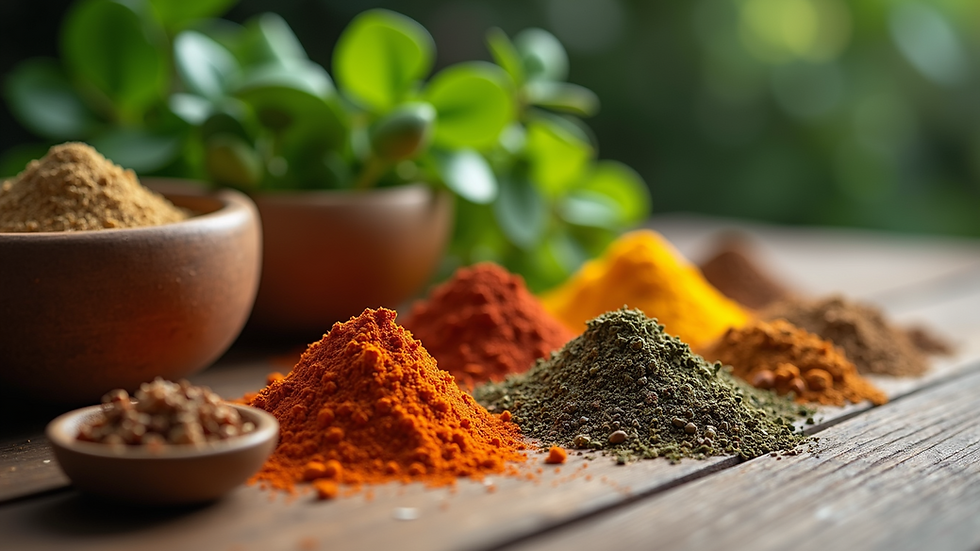How Ayurveda Utilizes Herbs to Support Wellness
- prexim
- Aug 11, 2025
- 3 min read
Ayurveda, the ancient Indian system of medicine, has been practiced for thousands of years. It focuses on balancing the body, mind, and spirit to promote overall health. One of the key elements of Ayurveda is the use of ayurvedic herbs. These natural plants and roots are carefully selected for their healing properties and ability to support wellness in a gentle, holistic way.
Ayurvedic herbs are used to treat a wide range of health issues, from digestion problems to stress relief. They work by restoring balance to the body's doshas - Vata, Pitta, and Kapha - which are the energies believed to govern physical and mental processes. This article explores how these herbs are used in Ayurveda to enhance health and vitality.
The Role of Ayurvedic Herbs in Traditional Healing
Ayurvedic herbs have been the cornerstone of traditional healing practices in India. Each herb is chosen based on its unique qualities and effects on the body’s doshas. For example:
Ashwagandha is known for its ability to reduce stress and improve energy.
Turmeric has powerful anti-inflammatory and antioxidant properties.
Tulsi (Holy Basil) supports respiratory health and boosts immunity.
These herbs are often combined in specific formulations to target particular health concerns. The preparation methods vary, including powders, teas, oils, and pastes, ensuring the herbs are delivered in the most effective way.
The use of these herbs is not just about treating symptoms but about promoting long-term wellness by strengthening the body's natural defenses and improving digestion, circulation, and mental clarity.

Close-up view of dried ayurvedic herbs in wooden bowls
Popular Ayurvedic Herbs and Their Benefits
Many ayurvedic herbs have gained popularity worldwide due to their proven health benefits. Here are some commonly used herbs and how they support wellness:
Neem - Known for its antibacterial and antifungal properties, neem is used to purify the blood and improve skin health.
Brahmi - Enhances memory and cognitive function, making it a favorite for mental clarity.
Shatavari - Supports female reproductive health and hormonal balance.
Ginger - Aids digestion and reduces nausea.
Amalaki (Indian Gooseberry) - Rich in vitamin C, it boosts immunity and promotes healthy aging.
Incorporating these herbs into daily routines can help maintain balance and prevent illness. They are often used in combination with lifestyle changes such as diet, yoga, and meditation for optimal results.

Eye-level view of fresh ayurvedic herbs on rustic wooden table
What are Ayurvedic Supplements?
Ayurvedic supplements are concentrated forms of these herbs, designed to provide targeted health benefits. They come in various forms such as capsules, tablets, powders, and liquids. These supplements are formulated to support specific body functions or address particular health issues.
For example, an ayurvedic supplement might combine Ashwagandha and Brahmi to help reduce anxiety and improve mental focus. Others might include Turmeric and Ginger to support joint health and reduce inflammation.
When choosing ayurvedic supplements, it is important to select high-quality products from reputable sources. This ensures the herbs are pure, potent, and free from harmful additives. Many people turn to trusted online stores for authentic ayurvedic herbal supplements.
Using these supplements as part of a daily wellness routine can enhance the body's natural healing processes and promote long-term health.
How to Incorporate Ayurvedic Herbs into Your Daily Life
Integrating ayurvedic herbs into your lifestyle can be simple and rewarding. Here are some practical tips:
Start with teas: Herbal teas made from Tulsi, Ginger, or Brahmi are easy to prepare and can be enjoyed daily.
Use powders: Many herbs come in powder form and can be added to smoothies, soups, or warm milk.
Try oils: Ayurvedic oils infused with herbs like Neem or Ashwagandha can be used for massage or skin care.
Cook with herbs: Incorporate turmeric, ginger, and other herbs into your cooking for added health benefits.
Take supplements: For targeted support, consider taking ayurvedic supplements as recommended by a healthcare professional.
It is important to consult with an Ayurvedic practitioner or healthcare provider before starting any new herbal regimen, especially if you have existing health conditions or are taking other medications.

High angle view of ayurvedic herbal powders with mortar and pestle
Embracing Ayurveda for Holistic Wellness
Ayurveda offers a comprehensive approach to health that goes beyond treating symptoms. By using ayurvedic herbs, it aims to restore balance and harmony within the body. These natural remedies support digestion, immunity, mental clarity, and overall vitality.
Whether through traditional preparations or modern supplements, incorporating these herbs into daily life can lead to improved well-being. The key is consistency and choosing the right herbs for your unique constitution.
Exploring Ayurveda and its herbal wisdom can open the door to a healthier, more balanced life. With the right knowledge and resources, anyone can benefit from the time-tested power of ayurvedic herbs.




Comments